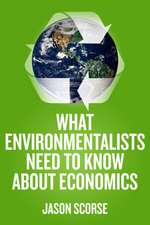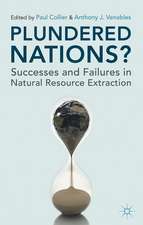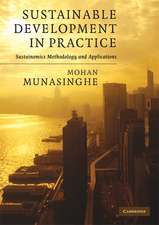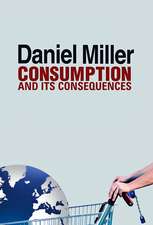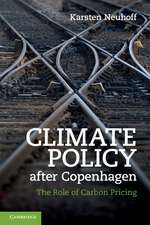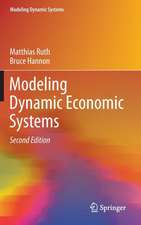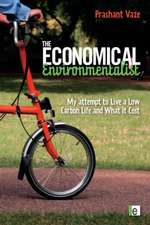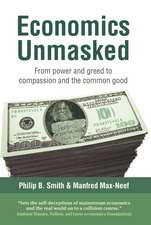Ecological Economics: Sustainability in Practice
Autor Stanislav E. Shmeleven Limba Engleză Hardback – 12 oct 2011
This book is packed with references for students with some background in economics, environmental science or mathematics who aim to develop the analytical skills required for redirecting our development path towards sustainability in government, international organisations, academia, non-profit sector and business. As such, the book is primarily aimed at MSc and first year PhD students reading for degrees in Environmental Change and Management, Ecological Economics, Environmental Management, Philosophy, Politics and Economics, and those taking part in similar programmes.
The book strives to develop the idea that a significant adjustment of the current economic theories is required, an idea supported by the emerged world economic crisis, the climatic and biodiversity crisis the world is currently facing and the enormously slow progress that has been made in the field of reorientation of the global economy towards sustainability.
The practical case studies provided focus on the most pressing topics of today, and the book adopts a positive approach for problem solving and strategic development, which is aimed at educating the future decision makers and business leaders.
| Toate formatele și edițiile | Preț | Express |
|---|---|---|
| Paperback (1) | 420.43 lei 38-44 zile | |
| SPRINGER NETHERLANDS – 23 aug 2016 | 420.43 lei 38-44 zile | |
| Hardback (1) | 491.82 lei 22-36 zile | +22.55 lei 5-11 zile |
| SPRINGER NETHERLANDS – 12 oct 2011 | 491.82 lei 22-36 zile | +22.55 lei 5-11 zile |
Preț: 491.82 lei
Preț vechi: 592.56 lei
-17% Nou
Puncte Express: 738
Preț estimativ în valută:
94.11€ • 98.51$ • 78.33£
94.11€ • 98.51$ • 78.33£
Carte disponibilă
Livrare economică 10-24 martie
Livrare express 21-27 februarie pentru 32.54 lei
Preluare comenzi: 021 569.72.76
Specificații
ISBN-13: 9789400719712
ISBN-10: 940071971X
Pagini: 268
Ilustrații: XIX, 248 p.
Dimensiuni: 155 x 235 x 20 mm
Greutate: 0.5 kg
Ediția:2012
Editura: SPRINGER NETHERLANDS
Colecția Springer
Locul publicării:Dordrecht, Netherlands
ISBN-10: 940071971X
Pagini: 268
Ilustrații: XIX, 248 p.
Dimensiuni: 155 x 235 x 20 mm
Greutate: 0.5 kg
Ediția:2012
Editura: SPRINGER NETHERLANDS
Colecția Springer
Locul publicării:Dordrecht, Netherlands
Public țintă
GraduateCuprins
Part I: Theory of Ecological Economics.- Introduction.- 1. The Economic System and the Environment.- 2. Industrial Ecology: Material and Energy Flows, Life Cycle Analysis.- 3. The Big Picture Vision and the Environment: An International Perspective.- 4. Economic Valuation and Decision Making: MCDA as a tool for the Future.- 5. Macroeconomy: Market Failures and Externalities: What Can Be Done.- 6. Economic Models and the Environment: Input-Output Analysis.- 7. Sustainable Development: Measuring Progress.- Part II: Ecological-Economic Applications.- 8. Climate Change and Renewable Energy: How to Choose the Optimal Pool of Technologies.- 9. Biodiversity Loss: New Methods for Evaluating Ecosystems.- 10. Sustainable Cities: Interdisciplinary Perspective.- 11. Regional Waste Management: Multicriteria Modelling.- 12. Business and Sustainable Development: CSR in Practice.- Index.
Textul de pe ultima copertă
In a concise and crisp manner, this book presents the state of the art in ecological economics, an interdisciplinary field focused on the analysis of sustainability of global, national and regional economic systems. An elegant guide, the book offers a range of cutting edge methods used in sustainability research including multicriteria decision aid (MCDA), input-output analysis, and life cycle analysis.
This book is packed with references for students with some background in economics, environmental science or mathematics who aim to develop the analytical skills required for redirecting our development path towards sustainability in government, international organisations, academia, non-profit sector and business. As such, the book is primarily aimed at MSc and first year PhD students reading for degrees in Environmental Change and Management, Ecological Economics, Environmental Management, Philosophy, Politics and Economics, and those taking part in similar programmes.
The book strives to develop the idea that a significant adjustment of the current economic theories is required, an idea supported by the emerged world economic crisis, the climatic and biodiversity crisis the world is currently facing and the enormously slow progress that has been made in the field of reorientation of the global economy towards sustainability.
The practical case studies provided focus on the most pressing topics of today, and the book adopts a positive approach for problem solving and strategic development, which is aimed at educating the future decision makers and business leaders.
This book is packed with references for students with some background in economics, environmental science or mathematics who aim to develop the analytical skills required for redirecting our development path towards sustainability in government, international organisations, academia, non-profit sector and business. As such, the book is primarily aimed at MSc and first year PhD students reading for degrees in Environmental Change and Management, Ecological Economics, Environmental Management, Philosophy, Politics and Economics, and those taking part in similar programmes.
The book strives to develop the idea that a significant adjustment of the current economic theories is required, an idea supported by the emerged world economic crisis, the climatic and biodiversity crisis the world is currently facing and the enormously slow progress that has been made in the field of reorientation of the global economy towards sustainability.
The practical case studies provided focus on the most pressing topics of today, and the book adopts a positive approach for problem solving and strategic development, which is aimed at educating the future decision makers and business leaders.
Caracteristici
Presents the state of the art in ecological economics, an interdisciplinary field focused on the analysis of sustainability of global, national and regional economic systems Presents a range of cutting edge methods used in sustainability research: multicriteria decision aid (MCDA), input-output analysis, life cycle analysis, etc. Contains practical case studies focused on the most pressing topics of today: renewables, biodiversity, waste management, sustainable business The methods are used in unique composition: e.g. lifecycle analysis is combined with multicriteria optimisation and GIS for studying regional waste management



